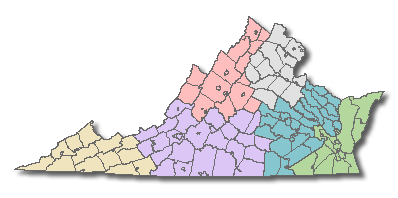DEQ regional offices

Click on a region to visit its web page.
Regional offices
- Tidewater Regional Office, Virginia Beach
- Piedmont Regional Office, Richmond/Glen Allen
- Northern Regional Office, Woodbridge
- Valley Regional Office, Harrisonburg
- Blue Ridge Regional Office, Lynchburg/Roanoke
- Southwest Regional Office, Abingdon
Other DEQ locations
- Central Office (Richmond)
- Air monitoring (Richmond)
- Surface water investigations (Charlottesville)
DEQ's regional offices are the primary point of contact for most people doing business with the agency regarding air, water, or waste issues. Regional activities include: permits, remediation, air quality, water quality, and compliance, monitoring and enforcement.
Permits
Most environmental permits from DEQ are issued by the permit section of each regional office.
These include all individual Virginia Pollutant Discharge Elimination System water permits, Virginia Pollution Abatement water permits, and Virginia Water Protection permits, except minimum instream flow projects and Virginia Department of Transportation projects.
This also includes all air permits: new and modified source permits, prevention of significant deterioration permits, state operating permits, and federal operating permits (Title V).
This also includes all permits for solid waste management facilities including landfills, compost facilities, transfer stations, material recovery facilities and other facilities that either treat, store, or dispose of solid waste.
For more information on specific types of permits: DEQ permits.
This permit section also handles many non-permitting functions, including pretreatment, water planning, construction assistance, and water plan approvals such as tax exemptions, plans and specifications, and certificates to operate.
DEQ's central office in Richmond issues hazardous waste management facility permits, general air and water permits, and Virginia Water Protection permits for minimum instream flow and VDOT projects. The remediation section in each regional office issues ground water withdrawal permits.
Remediation
Remediation programs include: underground storage tanks, aboveground storage tanks, ground water withdrawal permits, and landfill groundwater remediation.
Underground storage tank staff reviews and pre-approves UST-contaminated site studies and cleanup plans. They review requests for state reimbursement of certain petroleum cleanup costs. The staff provides for supply of drinking water when petroleum tank leaks have contaminated water supplies. Staff also inspects UST facilities for compliance with state and federal pollution prevention and leak detection requirements, and maintains UST facility registration and cleanup databases.
Aboveground storage tank staff reviews and approves Virginia oil discharge contingency plans and AST leak detection plans submitted by facility operators. They inspect facilities to evaluate emergency cleanup response capabilities and advise operators of pollution prevention requirements and practices.
Ground water withdrawal permit staff reviews applications for large ground water withdrawals (300,000 gallons or more per month) in designated Ground Water Management Areas. The staff reviews applicant water needs and potential sources, and evaluates predicted adverse impacts of withdrawals on ground water quality and quantity. They track compliance with issued permits, and also provide information to support the U.S. Geological Survey's regional ground water modeling effort for Virginia.
The regional solid waste groundwater staff provide technical review and evaluation of proposed remedies and corrective action plans for solid waste landfills where groundwater has been impacted.
Air Quality
Air quality is monitored for compliance with National Ambient Air Quality Standards. This type of monitoring evaluates the outdoor air within specific regions of the state, and monitoring data is available to the public.
The Northern Regional Office administers Air Check Virginia, Northern Virginia's vehcile emissions inspection and maintenance program. Air Check Virginia helps to ensure that vehicles are operating at the emissions levels for which they were designed and are not emitting excessive pollution.
The Piedmont and Northern regional offices administer the Stage II Vapor Recovery Program. This is a system used for the collection of vapors when gasoline is pumped into a motor vehicle from an underground storage tank at a gas station. The vapor control program is required in the Northern Virginia and Richmond areas.
Water Quality
Water quality conditions are monitored at numerous river and stream sites throughout each region as part of an ambient monitoring network. At selected sites, the macro-benthic community (aquatic insects and similar organisms) is assessed to determine overall water quality conditions. Certain public lakes are monitored during the summer months to assess water quality conditions.
The Tidewater, Piedmont and Northern regional offices monitor the major Chesapeake Bay tributaries (James, York and Rappahannock rivers) on a monthly basis in support of the Chesapeake Bay Program. Also, the Tidewater and Piedmont regional offices collect fish samples from the James River for Kepone analysis.
Special water quality studies are conducted to assess specific water quality concerns in each region.
Compliance, monitoring and enforcement
Permitted facilities are inspected on a regular basis to ensure compliance with permit requirements. Air, water and waste facilities, sites and sources are evaluated for compliance with regulatory requirements.
Facilities inspected include VPDES and VPA, laboratories, landfills, incinerators, regulated medical waste facilities, transfer stations, sewage treatment plants, hazardous waste treatment, storage and disposal facilities, and many industrial, private, military, and government sources that may pose potential or actual threats to human health and the environment. Operators are advised of situations that may require corrective action in order to maintain compliance with regulations.
Non-permitted facilities are inspected also, usually in response to complaints about air, water or waste issues. Complaints are investigated, and the regional offices use a pollution response program for after-hours responses as well as during regular business hours. Appropriate action is taken, which may include letters of non-compliance, notices of violations, or referrals to regional enforcement staff for consent orders.
